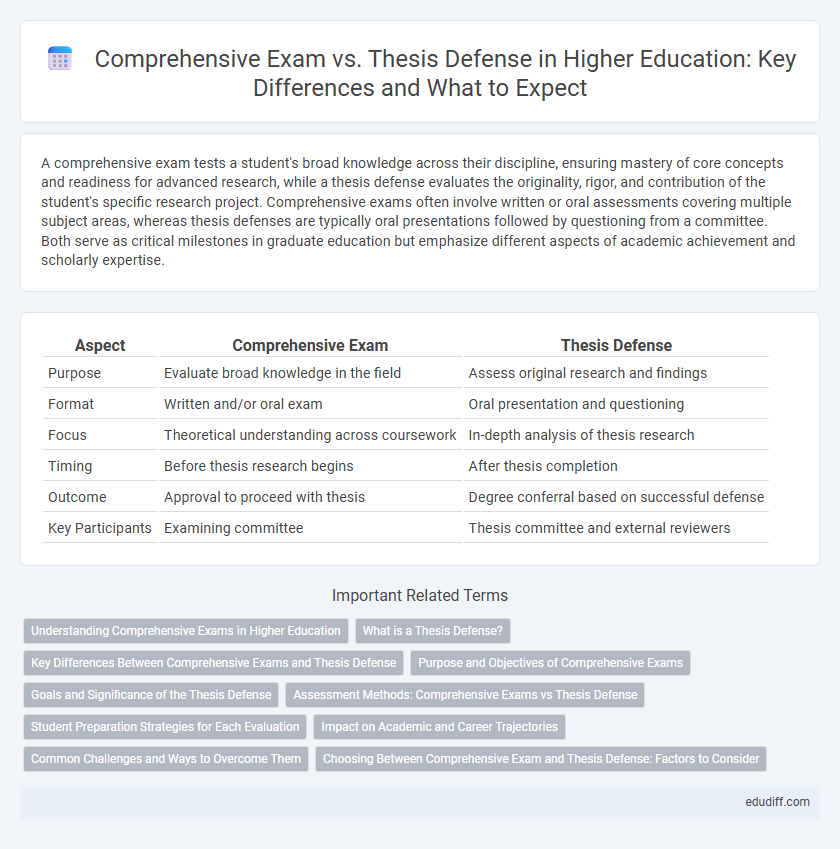A comprehensive exam tests a student's broad knowledge across their discipline, ensuring mastery of core concepts and readiness for advanced research, while a thesis defense evaluates the originality, rigor, and contribution of the student's specific research project. Comprehensive exams often involve written or oral assessments covering multiple subject areas, whereas thesis defenses are typically oral presentations followed by questioning from a committee. Both serve as critical milestones in graduate education but emphasize different aspects of academic achievement and scholarly expertise.
Table of Comparison
| Aspect | Comprehensive Exam | Thesis Defense |
|---|---|---|
| Purpose | Evaluate broad knowledge in the field | Assess original research and findings |
| Format | Written and/or oral exam | Oral presentation and questioning |
| Focus | Theoretical understanding across coursework | In-depth analysis of thesis research |
| Timing | Before thesis research begins | After thesis completion |
| Outcome | Approval to proceed with thesis | Degree conferral based on successful defense |
| Key Participants | Examining committee | Thesis committee and external reviewers |
Understanding Comprehensive Exams in Higher Education
Comprehensive exams in higher education assess a student's mastery of core knowledge across their discipline, ensuring readiness for advanced research or professional practice. These exams typically cover a broad range of topics within the major field and require critical thinking, synthesis, and application of key concepts. Unlike thesis defense, comprehensive exams evaluate overall competency rather than a specific research project.
What is a Thesis Defense?
A Thesis Defense is an academic examination where a graduate student presents and defends their research findings before a committee of experts. This process evaluates the originality, methodology, and significance of the thesis, ensuring the candidate's mastery of the subject matter. Successful defense results in the approval of the thesis as a credible contribution to the field.
Key Differences Between Comprehensive Exams and Thesis Defense
Comprehensive exams assess a candidate's broad knowledge across their academic discipline, requiring mastery of core subjects to advance in their graduate program. Thesis defense centers on presenting and justifying original research findings before a committee, emphasizing critical thinking and contribution to the field. The key difference lies in comprehensive exams evaluating overall academic competence, while thesis defense evaluates specific research expertise and scholarly communication.
Purpose and Objectives of Comprehensive Exams
Comprehensive exams evaluate a student's mastery of core knowledge across their field, ensuring readiness for advanced research or professional practice. They test comprehensive understanding and critical thinking rather than original research production. The primary objective is to confirm foundational expertise before progressing to specialized thesis work or doctoral candidacy.
Goals and Significance of the Thesis Defense
The thesis defense serves as a critical evaluation of a graduate student's original research, emphasizing the contribution to the academic field and the mastery of subject expertise. Unlike the comprehensive exam, which tests broad knowledge across coursework, the thesis defense requires the student to articulate their methodology, findings, and significance of their scholarly work. This process validates the research's originality and its impact on advancing disciplinary knowledge, ensuring readiness for professional or academic advancement.
Assessment Methods: Comprehensive Exams vs Thesis Defense
Comprehensive exams assess a student's broad mastery of their academic discipline through written or oral tests, emphasizing knowledge retention and application across coursework. Thesis defense evaluates the ability to conduct original research, requiring students to present and defend their findings before a panel of experts. Both methods measure critical thinking and subject expertise but differ in focus: comprehensive exams test cumulative knowledge, while thesis defenses prioritize research proficiency and scholarly contribution.
Student Preparation Strategies for Each Evaluation
Students preparing for comprehensive exams should focus on broad content review, practice answering diverse question formats, and develop effective time management skills to handle extensive material. For thesis defense preparation, in-depth knowledge of the research topic, ability to explain methodologies clearly, and anticipating potential questions from committee members are crucial. Tailoring study strategies to these distinct assessment formats enhances readiness and confidence in higher education evaluations.
Impact on Academic and Career Trajectories
Choosing between a comprehensive exam and a thesis defense significantly influences academic and career trajectories by shaping expertise and skill sets. Comprehensive exams evaluate broad knowledge, preparing students for diverse professional roles and interdisciplinary research, while thesis defenses demonstrate specialized research capabilities, often aligning with academic and research-oriented careers. Employers and academic institutions prioritize these credentials differently, with thesis defenses enhancing prospects in academia and comprehensive exams benefiting applied and industry-focused paths.
Common Challenges and Ways to Overcome Them
Common challenges in both Comprehensive Exams and Thesis Defenses include managing stress, mastering complex subject matter, and effectively communicating research findings. Strategies to overcome these difficulties involve thorough preparation through practice exams or mock defenses, developing concise and clear presentation skills, and seeking guidance from advisors to address gaps in knowledge. Time management and maintaining a balanced study schedule also play crucial roles in reducing anxiety and enhancing performance during these pivotal graduate milestones.
Choosing Between Comprehensive Exam and Thesis Defense: Factors to Consider
Choosing between a comprehensive exam and thesis defense depends on academic goals, program requirements, and career aspirations. Comprehensive exams emphasize broad knowledge mastery across subjects, ideal for students seeking versatile expertise or professional certifications. Thesis defenses prioritize original research and critical thinking, suited for those aiming at academic careers or specialized fields.
Comprehensive Exam vs Thesis Defense Infographic

 edudiff.com
edudiff.com